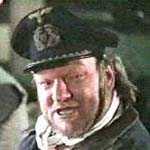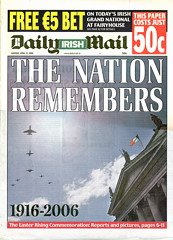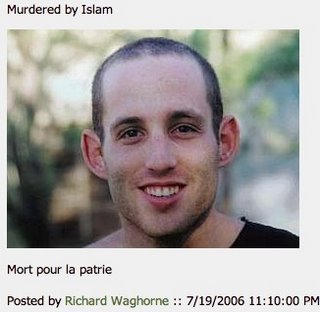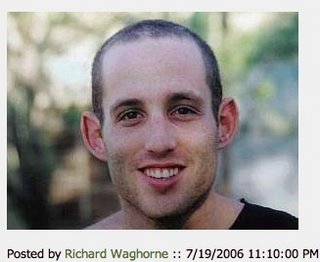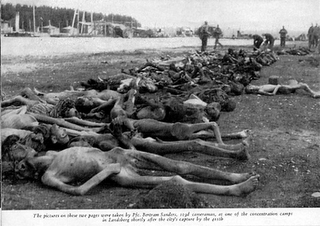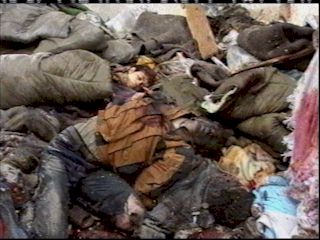
Eamonn Fitzgerald's
Rainy Day happily finds itself in the position this week of being able to both bash the UN and advance Israeli policies
at the same time:
"UNIFIL, unfit
This is the mission statement: "UNIFIL was created in 1978 to confirm Israeli withdrawal from Lebanon, restore the international peace and security, and help the Lebanese Government restore its effective authority in the area." We're talking about the United Nations Interim Force in Lebanon. Costing $233 million a year, UNIFIL has brought neither peace nor security to the area. Now Kofi Annan is calling for a larger UN force to be sent to the region. Is he unwell?"
The US war in Iraq has
cost about 300
billion dollars as of right now, and most certainly provides neither 'peace nor security'[1]. Given that Mr. Fitzgerald has now publicly advocated these criteria to judge miltary deployments on, will he now call for the withdrawal of US troops from Iraq? We suspect not. We will, however, let the following accounts speak for themselves as to the truth of whether or not UNIFIL has brought 'peace nor security':
The
Washington Report on Middle East Affairs, Jan/Feb 1999:
"As UNIFIL marks the 20th anniversary of its presence in this troubled country, it has a great deal of support from local residents. “After Qana the connection became stronger,” Orsini said. “People saw U.N. soldiers risking their lives to distribute food and other assistance, during the shelling when they didn’t have to. They know the U.N. has taken casualties.”
The connection between the blue helmets and the residents was clear in Aaita al Jabal, where three Irish soldiers sat sipping tea and eating cookies with a Shi’i family within sight of SLA guns, along the “frontline.” The farmers of Aaita al Jabal eke out a living growing tobacco on lands directly under the SLA/IDF positions.
UNIFIL’s Irish Battalion provides daily security escorts to the farmers as something of a deterrent. However, both IrishBatt soldiers and the villagers agree that it doesn’t deter much. There is frequent shooting from the SLA/IDF position, and when the firing comes too close, the farmers have been known to crowd inside UNIFIL’s armored personnel carrier.
[...]
Within Aaita el Jabal, the Irish soldiers conduct twice-daily patrols in addition to special protection during harvest time. However, it is perhaps the general assistance they provide that makes their connection with the village so strong.
“People build houses around the UNIFIL positions,” explained Major Ahern. “If UNIFIL wasn’t here the population wouldn’t be here.” IrishBatt works with orphanages, provides medicine to area clinics, and in Aaita al Jabal even helped a farmer get his stalled tractor moving again during a visit by the writer.
As part of its mandate, UNIFIL is providing security for the construction of a school in Aaita al Jabal. When the school is completed IrishBatt will, on its own, donate supplies and equipment. “For 40 years the Lebanese government has promised to build a school. The presence of IrishBatt finally makes it possible to do it,” explained the moktar (mayor)"
And
why could UNIFIL not fulfil its original mandate?
"In late Jul and early Aug 78 the Lebanese government attempted to assert its authority in the south by sending a 700-man Lebanese Army battalion into the area of operations via the Bekka Valley. Its advance was halted by the Christian militia de facto Forces on 2 Aug 78 as both the Lebanese Army and UN troops in the area came under heavy fire. The Lebanese government accused Israel of participating in this action. Intermittent shelling in the Kaoukaba, Marjayoun and Beaufort areas continued for two weeks as negotiations continually broke down. Unable to extend Lebanese authority in the South, this regular Lebanese Army unit was withdrawn. During the remainder of Aug and Sep 78 the pattern continued as heavily armed roadblocks in the Christian enclave impeded UNIFIL operations.
The relationship between the IDF and the de facto forces of Maj Haddad, who in essence provides Israel with a buffer zone, is the major factor that has prevented the complete restoration of Lebanese sovereignty in southern Lebanon. During the first six months of operation 11 members of UNIFIL had been killed and 52 injured as a result of firing incidents and mine explosions. On 18 Sep 78 the UNIFIL mandate was extended for an additional four months. "
Just to
drive home the point:
"Until now, however, it has not been possible for UNIFIL to carry out in full its original mandate. From its inception, the Force had to operate under extremely difficult conditions. The PLO and the Government of Israel never fully accepted the UNIFIL mandate with all its implications. Given these attitudes, the Force was prevented from deploying fully in the area evacuated by the Israeli forces between April and June 1978. In fact, the enclave along the border was turned over to the "de facto forces" (Christian and associated militias supported and supplied by Israel). Israel thus retained a degree of military power in the area and continued its fight against the PLO and its Lebanese allies. UNIFIL's efforts to implement its mandate in these conditions inevitably met with only partial success and caused the Force to suffer significant casualties.
In June 1982, Israel invaded Lebanon again. This invasion changed UNIFIL's situation drastically. For three years, UNIFIL in its entirety remained behind the Israeli lines, with its role limited to providing protection and humanitarian assistance to the local population to the extent possible. In 1985, Israel carried out a partial withdrawal, but it retained control of an area in southern Lebanon, manned by the Israel Defence Forces (IDF) and by Lebanese de facto forces (DFF), the so-called "South Lebanon Army".
The situation in southern Lebanon continues to be tense and volatile. The boundaries of the Israeli- controlled area have not been clearly defined but are determined de facto by the forward positions of IDF/DFF. Within the area of operation of UNIFIL, IDF/DFF maintain 72 military positions. IDF/DFF remain targets for attacks by armed groups opposed to the occupation. For their part, IDF/DFF react vigorously to these attacks, often with heavy weapons and with air support from Israel.
UNIFIL has thus been prevented from carrying out its mandate. In the circumstances, it endeavours, to the best of its ability, to prevent its area of operations from being used for hostile activities and to protect civilians caught in the conflict. In carrying out its tasks, the Force is sometimes hampered by firing in close vicinity to its positions and personnel. On a few occasions, UNIFIL has itself been the target of violence.
UNIFIL's operations are based on a network of positions which are manned 24 hours a day. The Force maintains 45 checkpoints, whose function is to control movement on the principal roads in UNIFIL's area; 95 observation posts, whose function is to observe movement on and off the roads; and 29 checkpoints/observation posts which combine the functions of control and observation. Each is assigned responsibility for ensuring that hostile activities are not undertaken from the area surrounding it. This involves not only keeping watch from the position but also patrolling on foot or by vehicle in its vicinity.
In addition, unarmed military observers of the United Nations Truce Supervision Organization (UNTSO) maintain five observation posts and operate five mobile teams in the area under Israeli control. The UNTSO observers are under the operational control of UNIFIL's Commander.
UNIFIL's network of positions and the patrols mounted from them also play a central role in the Force's performance of its humanitarian task. They provide the civilian population with protection and with a source of help if they are subjected to harassment. Within available resources, UNIFIL also provides civilians with medical supplies, water, food, fuel, electricity, engineering work and escort for farmers. UNIFIL medical centres and mobile teams have provided care to an average of 3,000 civilian patients per month and a field dental programme has also been provided."
Irishbatt served with UNIFIL in Lebanon between May 1978 and November 2001, rotating through 30,000 men and women and taking 47 casualties, 18 in action. There's a granite memorial with these names inscribed standing on a hill overlooking Tibnine, left there by the departing Irish troops in 2001.
An Cosantóir (the official Defence Forces magazine) is unfortunately still unavailable on the web: there is, however, a short excerpt from the magazine's commemorative UNIFIL edition published in 2001
here (PDF). Some passages from the bits not online:
Robert Fisk, Middle-East journalist and good friend through the years to Irishbatt:
"There was always something very Irish about southern Lebanon. The hillsides around the Irishbatt area looked like Galway, the winter storms might have come off the Atlantic, and the people with their immediate hospitality towards strangers - could have been from Mayo or Cork [...] It was a dangerous time. Saad Haddad's tinpot, ruffian militia quickly decided that Irishbatt was too dedicated, too reluctant to allow the 'Free Lebanon Army' - later transmogrified into the 'South Lebanon Army' - run roughshod over the UN lines. They called them the 'Johnny Walker' Irish; a slur that was as nasty as it was geographically inappropriate. The Israeli press took up the same story; the Irish were pro-IRA, 'pro-terrorist', pro-PLO drunkards [...] I still think that Irishbatt's refusal to hand over the village of At Tiri to the SLA was a formative moment in Unifil. UN missions can succeed if they start well. They will always fail if they start badly. At Tiri was a test of Unifil and of the Irish, and Private Stephen Griffin, just 21 years old, was the sacrifice."
Timor Goskel, UNIFIL Press Officer (1979-2001), on the creation of UNIFIL:
"You must remember that just a few months before the Israeli invasion, President Sadat of Egypt had paid an historic visit to Israel. President Carter of the US didn't want to waste this opportunity to make an important start on the road to peace in the Middle East. The Americans felt that to keep the momentum of the Sadat visit going, they needed to just keep a lid on things in Lebanon. So in a rush, the UNIFIL mandate was created by the UN.
I talked to a lot of UN officials afterwards who said that they opposed the creation of this force. They had asked some very basic questions at the beginning, like who is the national authority? What guarantees do we have that all the parties will allow us to implement the mandate? They'd envisaged staying just six months, maybe a year, and then getting out. I guess this wasn't realistic"
More:
"'At the time of the Israeli shelling known as Operation 'Accountability' in 1993, Irishbatt sent troops down here [to the Tibnine orphanage] to stay with the children for the seven days. Also in 1996, during Operation 'Grapes of Wrath', Irish soldiers remained in the orphanage for the 16 days of bombardment. Just by being there to hold the children's hands and smile at them and be with them when the bombs were going off gave the children confidence and reassurance. It is such kind actions that stay with you. If you talk to some of the children about the Irish leaving, they cry. They can't believe it'
[...]
'In 1993 our house was destroyed by a plane, ' [Famte] says. We stayed in the school in the village for the summer [....][UNIFIL interpreter] Hassan spoke to the Irish Battalion officer. The battalion built an entire new house for us, and gave us everything in it.'
[...]
'In the war with Israel in 1996, one day amid the 16 days of rat-tat-tat there was quiet. So me and my mother and my sister came from the hospital, where we were sheltering to our house to take some things that we needed. When we arrived at our house, a plane came right down. An Irish soldier saw this, and he knocked on the window and made a sign "don't be scared". I'll never forget'
[...]
When Famte, an exceptional student at school, expressed an interest in studying for a law degree in university, Irishbatt were only too happy to pay for Famte's third-level education in Beirut, as well as that of her sister, Malak, who decided to study physics. [...] 'I have this ambition to be a judge, but I will have to go to Beirut.' she says"
This, ladies and gentlemen, is how you carry out peacekeeping and render humanitarian assistance. More than that, it's how you behave as decent human beings - and as a side-effect, win those hearts-and-minds. Israelis and US please take note.
But, back to our featured authority on UNIFIL and the Lebanon:
"Talking of poor form, Lebanese Prime Minister Fouad Siniora is saying that Israel is "opening the gates of hell and madness" on his country. The man must be suffering from schizophrenia, just like his country is. Lebanon is a land with two personalities. One act like a normal state; declares itself to be free, welcomes tourists and property developers and purports to act in moderation. The other persona consorts with an organization that uses terror against civilians, bathes in racist rhetoric and demands the liquidation of Israel. Siniora needs to be reminded that because his governing partner staged a cross-border attack on its neighbour from Lebanese territory (watched over by UNFIL) that resulted in killing and kidnapping, his country is now paying for its duplicity."
Mr. Fitzgerald might do well to note that the same description of "schizophrenia" also neatly attaches to Israel. It was
created as yet another ill-fated project of the British Empire; won independence
through means which many of Mr. Fitzgerald's fellow travellers of the international anglophone right term "terrorist" in
other contexts; established a gerrymandered Jewish state through the
forced ejection of a population from their ancestral homes (and still refuses them the right to return to their properties); connived with the US, UK and France several decades ago to complete a secret atomic program
resulting in a present-day arsenal of a couple of hundred nuclear weapons; was
a principal ally of and
collaborator with Apartheid-era South Africa; is still
stealing Arab land; is a
deeply xenophobic society placing
no value on the
lives on
non-Israelis and
with a
record of
casual murder; and apparently possesses a carte blanche from the US to
pursue WMD programs reminiscent of Nazi Germany:
"In January 1999, the British Medical Association (BMA) began warning the world of the dangers of ethnic weapons. Although the report, “Biotechnology, Weapons and Humanity,” made no direct charge, it said the BMA could no longer ignore the varied reports that such weapons were currently being developed. The report concluded: “Weapons could theoretically be developed which affect particular versions of genes clustered in specific ethnic or family groups.” The possibilities of producing such weapons have been enhanced with the 2002 completion of the Human Genome Project.
The 1999 BMA study was provoked in part by a 1998 story in the London Sunday Times alleging that Israel already had developed a genetically specific weapon. “Unnamed South African sources,” according to a report cited by the Times, “[say] Israeli scientists have used some of the South African research in trying to develop an ‘ethnic bullet’ against Arabs.” Reported links between Israel’s ethnic weapons and South Africa’s Project Coast are tentative; some would say tenuous. But the possibility of such links is terrifying, and justifies as much scrutiny as was focused on Iraq’s imaginary arsenal. "
The keeping of all these dirty little Israeli secrets from wider public knowledge, of course, necessitates a take-no-prisoners propaganda campaign abroad, principally in the US whose public largely foots the bill for this wickedness through their tax dollars. Thus we get the vilification of any commentators deviating even an inch from the Israeli government line, with even
Jewish critics of extreme Zionism labelled as "anti-Semites". But we digress.
Back to
Rainy Day:
"But maybe Fouad Siniora is more deluded than we know and maybe his country isn't a country at all. As Austin Bay so lucidly points out: "Israel is being fired upon from a Lebanon that 'is not quite Lebanon' in a truly sovereign sense. The rockets, of course, come from 'somewhere,' but Hezbollah's 'somewhere' is a political limbo in terms of maps with definitive geo-political boundaries. Lebanon is a 'failed state' — a peculiar failed state (it's not Somalia), but nevertheless failed. It will continue to fail so long as the Lebanese government cannot control Hezbollah — and control means disarm." Indeed."
As myriad others have noted, the same spurious justifications could easily have been extended to provide cover for the UK attacking the Republic of Ireland during
The Troubles [2]. How does Eamonn Fitzgerald square that circle, we wonder? Onwards to his conclusion:
"It's not going to be easy to make peace with a country that can't make up its mind about what it is. That last thing it needs is thousands more "peacekeepers" for a mission that is doomed to be unfulfilled. Send them to Darfur instead. No illusions or delusions there, at least."
Let's see.
"WASHINGTON The UN secretary general, Kofi Annan, met President George W. Bush and his top aides, and, without asking for specific U.S. commitments, made clear that he believed the United States would have to play a significant role in deploying a new kind of peacekeeping force in the Darfur region of Sudan.
[...]
But the import of the meeting, said one senior official, is that "the president signed on to the concept and understood that we will need Western assets and the U.S. would have to be part of it."
When the resolution was passed, U.S. officials made it clear that no American troops would be sent to Darfur. "
Looks like somebody else out there has complications with "illusions or delusions" of their own.
Addendum: This post was begun on a Friday, and was still unfinished by the Saturday night/Sunday morning (it's been a busy weekend). So we're able to address here two Rainy Day follow-ups developing on the same Zionist theme. The
first is a gimmick that we've
seen the pro-Israel right employ before:
SERIAL NO. 3817131: Israel's female soldiers
The photographer Rachel Papo was born in Ohio, but raised in Haifa. At the age of 18, she began two years of mandatory service in the Israeli military. After serving her time, she returned to the U.S. to attend art school, but was drawn back to the Middle East where the subject of the young women serving in the Israeli Army became the focus of her creative energy. The result is a collection called SERIAL NO. 3817131 [...]
[snip blurb. You can catch it here, and we've blogged on SERIAL NO. 3817131 before]
We can draw our own conclusions when looking at the images of SERIAL NO. 3817131.
Indeed we can, particularly seeing how swiftly
last year's Lebanese pinup appears to have been forgotten. The
infidelities of the Anglophone right-wing male and his
principles affections ought to be borne in mind by freedom-loving young women everywhere in the world, we fear. On to our
last Rainy Day piece:
Kofi Annan, the UN and Hezbollah
The kidnapping of three Israeli soldiers on Mount Dov on 7 October 2000 by Hezbollah terrorists was witnessed by several dozen UNIFIL troops who stood idly by. An indication of broader UN anti-Israel, anti-Semitic attitudes?"
Even the briefest perusal of the official UN
report on the incident in question reveals that no UN personnel were witnesses to the attack in question. We realise that we live in days when even the most
ignorant and extremist self-proclaimed 'commentator' can get himself onto the airwaves, but this is a shocking outbreak of wingnuttery even so, and by someone who (as an Irish citizen oughting to be even peripherally aware of the Irish experience in "the Leb") should know better.
The above is an extremely serious charge made by Eamonn Fitzgerald, bearing on the honour of all Irish UNIFIL (and indeed UN) veterans, some of whom have returned in bodybags; and we hope he has the decency to post a swift and full retraction and apology on his blog. We're waiting.
No better place to look for a conspiracy theory than at Volokh Conspiracy. The analysis is anything but hysterical, though, and the conclusion is troubling:
"So there is no anti-semitic conspiracy at the UN, in the sense of a conspiracy directed by people who are deeply motivated by hatred of Jews. Rather, the UN's criminal complicity in the kidnapping of Israelis, like the rest of the UN's anti-Israelism, is explainable as the logical result of a wide variety of UN actors behaving according to their self-interest."
There was no "[UN] criminal complicity in the kidnapping of Israelis", as the UN report makes clear. The Israeli state and their apologists in the pro-Israel right are nothing if not audacious liars, though.
"The Rainy Day position on Kofi Annan is that he has had two terms to sort out the bureaucratic morass that is the UN and he has failed dismally. He failed dismally because he's a creature of the UN bureaucracy and thus incapable of visualizing or implementing reform. It is only right and reasonable that the US and Japan should withhold payment from such an organization. Maybe the next secretary general will try to clean up the UN, but don't bet on it."
These last pious sentiments were brought to you by a blogger who has been an enthusiastic Bush administration supporter from the beginning, right through Enron, Iraq, Katrina etc. to the present day. An answer in itself?
[1] a related piece of trivia is that the Irish State bore the cost of the UNIFIL deployment in the Nineties, due to the GOP-controlled Congress which came in with the Gingrich Revolution refusing to pay US contributions to the UN budget. This marked the start of their campaign (in the post-Cold War world) against the civilising restrictions that the existence of an international body imposes on a lone superpower. The underhanded appointment by the Bush administration - without US Senate approval - of the malevolent John Bolton as US Ambassador to the UN is just the latest step in this war.
[2] or, as Henry Farrell over at
Crooked Timber points out, as an IRA apologism for killing innocent bystanders.

